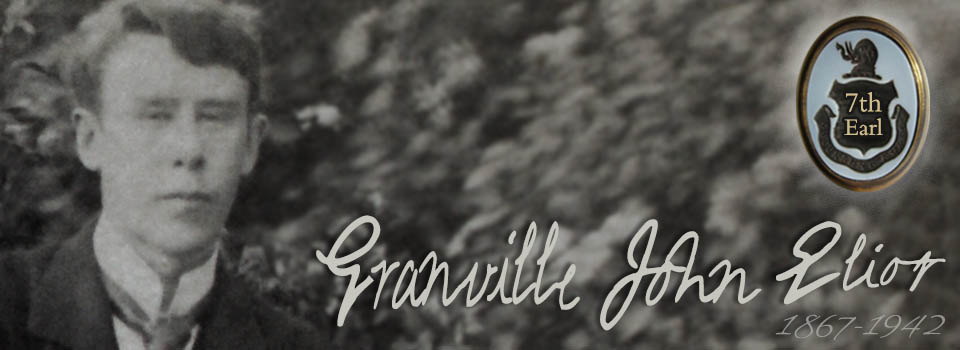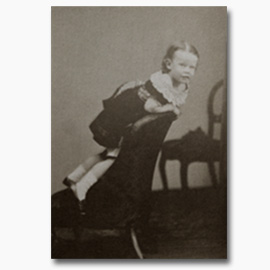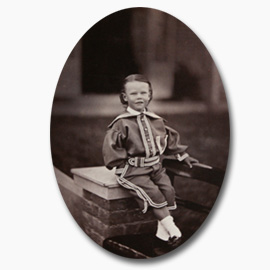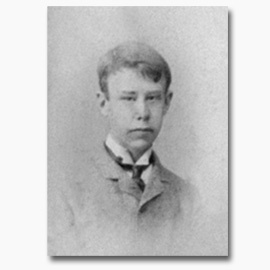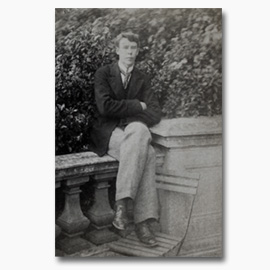Granville John Eliot, 7th Earl of St. Germans (1867 - 1942)
Granville was the second child and first son of Charles Eliot and Constance Guest, known to family and friends as Jack.

— "Royal Cornwall Gazette" Thursday, 26 Sep 1867:
At Port Eliot, September 22, the wife of Captain the Honble Charles Eliot, of a son.
— Went into a nursing home near the beginning of 1921 and never returned to his own house. During his twenty years as Earl St. Germans, he was never in Cornwall or at Port Eliot.
— "Portsmouth Evening News" 05 Apr 1922, page 7:
UNEXPECTED INHERITANCE BY A CLERK.
Granville John Eliot, the new Lord St. Germans, was formerly a bank clerk in the Malvern branch of the Capital and Counties Bank. About 18 months ago his health broke down, and he had to relinquish his clerkship and go into a nursing home. He is a much older man than his late cousin, whose tragic death has put him in possesion of the St. Germans earldom and estates. He has taken no part in the social life of Malvern, and had never expected to succeed to his cousin's title.
— "Shields Daily News" 06 Apr 1922, page 3:
BANK CLERK TO EARLDOM
ROMANCE OF SUCCESSION TO EARL OF ST. GERMANS.
Mr. Granville John Eliot, the new Earl of St. Germans, who has succeeded to the title on the death of his cousin -- the sixth Earl -- was until a year ago a clerk in the Malvern branch of the Capital and Counties Bank. An official of Lloyd's Bank (with which the Capital and Counties Bank is now incorporated) told an 'Evening News' representative that the Earl became a bank clerk at Worcester with Berwick's Bank in 1885. He was then 18 years of age. When Berwick's was incorporated with the Capital and Counties, he remained with the joint concern, and was transferred to Malvern. He retired last year at the age of 55 after 36 years with the three banks. A friend of the Earl said today that he had achieved very little banking success. He stuck to banking business because it gave him something to do.
— "Western Gazette" 07 Apr 1922, page 12:
EARLDOM FOR A CLERK.
Granville John Eliot, the new Lord St. Germans, was formerly a bank clerk in the Malvern branch of the Capital and Counties Bank. He never expected to succeed to his cousin's title.
— Extracts from "Sunday Post" 9 Apr 1922, page 16:
BANK CLERK FALLS HEIR TO EARLDOM
VACANT BY THE PASSING OF POPULAR OFFICER OF THE SCOTS GREYS.
There is a romantic story surrounding the a former bank clerk's succession to the Earldom of St. Germans. The news of the sudden death from pneumonia in Johannesburg Hospital of the young Earl — he was only thirty-one — came as a painful shock to his family and an unusually wide circle of friends.
The new Earl of St. Germans is his cousin, Mr. Granville John Eliot. He is fifty-five years of age, and is at present staying in the country for the benefit of his health, being an invalid.
A CLERK FOR 36 YEARS
He entered the banking profession in 1885, when he was eighteen years of age, simply in order to occupy his time, and for thirty-six years he was a clerk in three different banks in Worcester and Malvern.
He occupied unpretentious lodgings in Malvern, and his life generally was fashioned upon a most modest scale. His tall figure was very well known in the town, but he appears to have made few intimate friends.
He belonged to a local club, but he took no part in the social life of the town. He does not seem to have indicated to anybody that there was a prospect of heritage, and the announcement of his succession was received in the locality with mild surprise.
About eighteen months ago his health broke down completely, and he had to relinquish his post and enter a nursing home.
He succeeds to a stately London mansion in one of the most exclusive squares in the Metropolis, as well as a fine estate at Port Eliot, St. Germans, Cornwall, comprising 7,000 acres, but town life does not suit him, and it is not expected that the new Earl will entertain very much or seek to achieve the prominence in society and sporting circles enjoyed by his late cousin.
Debarred as he is from the more strenuous pursuits with which the family traditions are associated, he finds most of his enjoyment in the company of books and music — he is a clever violinist and also a talented artist — in the quietude of his rural retreat. Thus very few of the society people familiar with his predecessor have come into contact with him, since he avoids any but his most intimate friends.
One of his brothers is Captain Arthur Eliot, part-author of the "Better ‘Ole," and is a dramatist and cricketer.
— "Western Morning News" 12 Mar 1923, page 4:
The King has ordained that Mr. M.C. Eliot, O.B.E., late lieutenant-commander, R.B.V.R., Mr. C.E.C. Eliot, O.B.E., sometime honorary lieutenant-colonel, R.M., Capt. A.E.H. Eliot, retired, Capt. E.G. Eliot, late R.G.A.,, and Blanche Elizabeth, widow of Mr. S.O. Eaton, of Tolethorpe Hall, Rutland, the brothers and sister of the Earl of St. Germans, shall enjoy the same title and precedence as the sons and daughter of an earl as would have been due to them respectively if their father had survived his nephew, the late Earl of St. Germans, and thereby succeeded to that title and dignity.
— "Yorkshire Evening Post" 21 Nov 1942, page 4:
HIS HOLDING IN LONDON
The Earl of St. Germans, who has died at the age of 75, was the 7th earl, and succeeded to the earldom in 1922 on the death of a cousin. It was recently owned about 1-1/2 square miles of London. He was unmarried, and the heir to the title is his brother, the Hon. Sir Montague Charles Eliot, who is 72.
— "Western Morning News" 21 Nov 1942, page 6:
SEVENTH HOLDER
Death of the Earl of St. Germans
The Earl of St. Germans, seventh holder of the title, which was created in 1815, died yesterday. He was 75 years of age, and succeeded his cousin to the title in 1922. Little was known of him in Cornwall and he never took up residence at Port Eliot. Instead, the Cornish family seat was occupied by his brother, the Hon. Sir Montague Charles Eliot, who now succeeds to the title. He is of course, very well known in the county having been associated with many organizations, and since the death of Lord St. Levan has been Prov. Grand Master of Cornish Freemasons . . .
[Obituary continues with more information on Monty, the new Earl.]
— "England & Wales, National Probate Calendar (1858-1966):
Earl of St. Germans, the right honourable Granville John of Port Eliot St. Germans Cornwall died 20 November 1942 at Wonham House Bampton Devonshire Administration (limited to settled land) Llandudno 4 October to Eliot George Bromley-Martin, retired banker, and Edward Holland Martin, director Bank of England. Effects 380,000 pounds.
Further Grant 26 April 1945.
— http://www.bampton.org.uk/history-war-memorial.html
Wonham House, rebuilt in 1850 by the then Lord of the Manor, John Collins J.P., was obtained in 1939 for the duration of the war as a mental hospital, which had evacuated itself from The Flower House, Beckenham Hill Road, London.
— "Gloucestershire Echo" 15 Dec 1944, page 1:
EARL'S WILLS JUDGMENT
Lord Merriman, the President, in the Probate Court, London, today, pronounced for the will dated December 7, 1920, of the Seventh Earl of St. Germans, of Port Eliot, Cornwall, who died in 1942, aged 75.
This will was set up by the Earl's illegitimate son, Mr. Henry Cornwallis Eliot, cited as John Eliot Benfield, in whose favour it had been made.
Before succeeding to the title in 1922, the Earl had been a bank clerk at Malvern, Worcestershire. Shortly after making the 1920 will in a London nursing home he became of unsound mind. The amount of the estate involved in the action was stated to be about £4,500, or £1,700 after payment of death duties.
Lord Merriman said in his judgment it was clear beyond doubt that the testator always acknowledged without reservation the paternity of the son. The President said: 'I pronounce for the will for December 7, 1920, and I disallow expressly the defendant's costs as executor. The plaintiff will pay the costs of the action, but the intervenor Mr. Llewellyn Tudor Sillery, who has not pleaded but must have incurred some costs, will receive his costs out of the estate. I think that this is a dreadful case which should never have been brought.'
